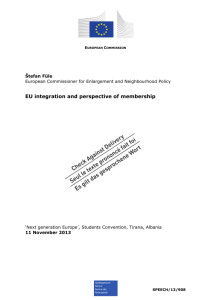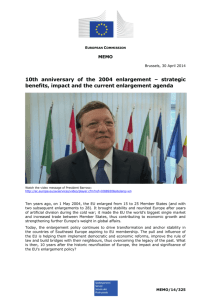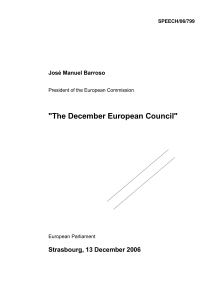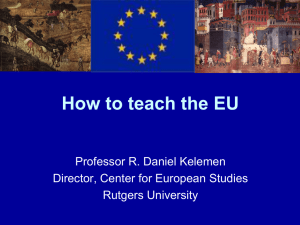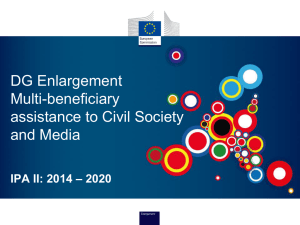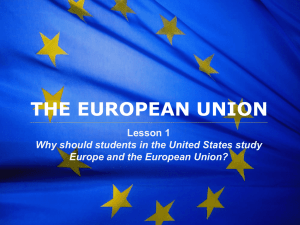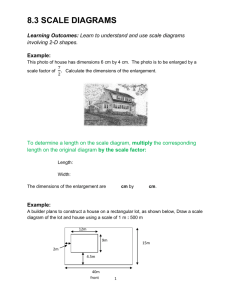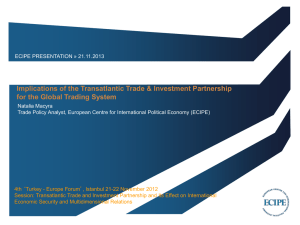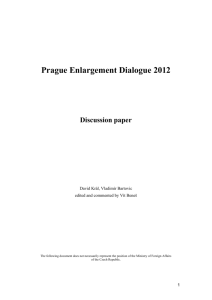REMARKS BY
advertisement
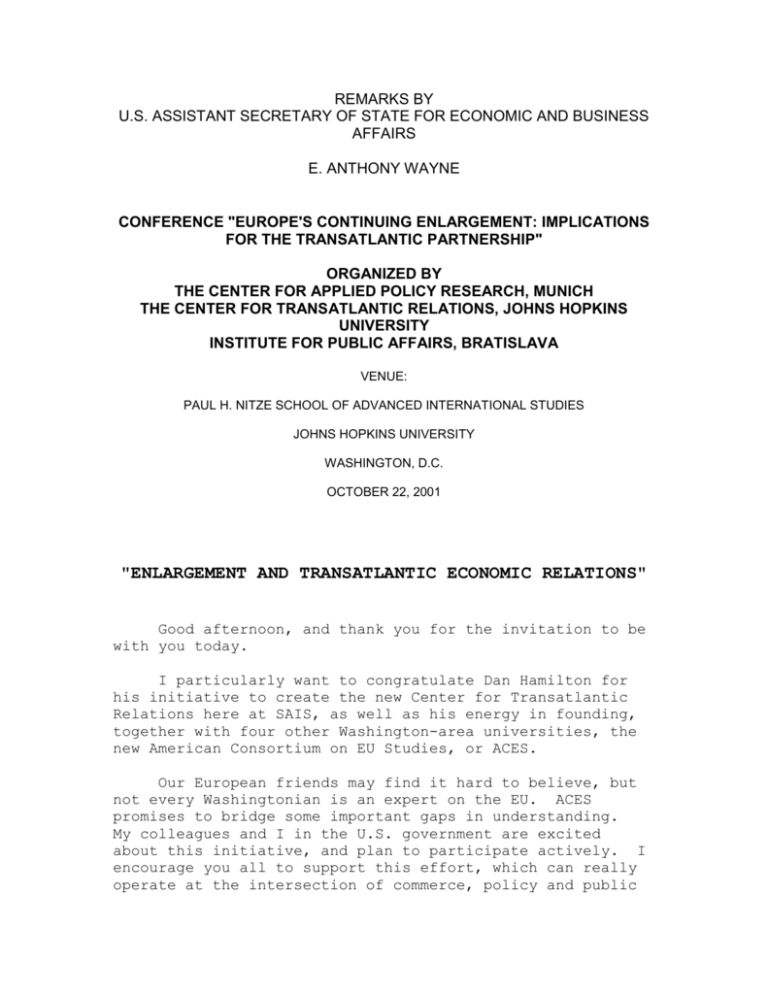
REMARKS BY U.S. ASSISTANT SECRETARY OF STATE FOR ECONOMIC AND BUSINESS AFFAIRS E. ANTHONY WAYNE CONFERENCE "EUROPE'S CONTINUING ENLARGEMENT: IMPLICATIONS FOR THE TRANSATLANTIC PARTNERSHIP" ORGANIZED BY THE CENTER FOR APPLIED POLICY RESEARCH, MUNICH THE CENTER FOR TRANSATLANTIC RELATIONS, JOHNS HOPKINS UNIVERSITY INSTITUTE FOR PUBLIC AFFAIRS, BRATISLAVA VENUE: PAUL H. NITZE SCHOOL OF ADVANCED INTERNATIONAL STUDIES JOHNS HOPKINS UNIVERSITY WASHINGTON, D.C. OCTOBER 22, 2001 "ENLARGEMENT AND TRANSATLANTIC ECONOMIC RELATIONS" Good afternoon, and thank you for the invitation to be with you today. I particularly want to congratulate Dan Hamilton for his initiative to create the new Center for Transatlantic Relations here at SAIS, as well as his energy in founding, together with four other Washington-area universities, the new American Consortium on EU Studies, or ACES. Our European friends may find it hard to believe, but not every Washingtonian is an expert on the EU. ACES promises to bridge some important gaps in understanding. My colleagues and I in the U.S. government are excited about this initiative, and plan to participate actively. I encourage you all to support this effort, which can really operate at the intersection of commerce, policy and public opinion on our most important relationship across the Atlantic. This conference is a great start. Enlargement of the European Union is, of course, an issue for the EU to decide. It's obviously important, however, and something we are interested in, so I will make a few general observations from the U.S. perspective, and then put the question in the larger context of Transatlantic economic relations. Just as we supported European integration at its beginning in the 1950's, we continue to support it now as a force for stability on the European continent. As a general principle, we also strongly support the integration of the new democracies into the political and economic institutions of the West. We expect that business prospects for U.S. firms in Central and Eastern European countries would, in most instances, improve once EU accession is completed. Why is EU enlargement interesting to the United States? For one thing, consider the scope of the proposed accessions: -- Thirteen countries are currently under consideration for membership -- the longest candidate list in history. With many of these countries, we have longstanding economic ties deepened by family, cultural and emotional links forged in decades of immigration to the United States from Central Europe, their struggle for freedom during the Cold War, and by their new membership in NATO and the Partnership for Peace. -- If all thirteen eventually join the EU as members, it would increase the EU's area by more than a third, and its population by 130 million. Beyond that, the U.S. and the EU already share the largest two-way trade and investment relationship in the world: The trade flow amounts to more than a billion dollars every day, and two-way foreign direct investment is more than $1 trillion. The U.S. and the EU together account for about 37 percent of the value of global trade in goods and about 45 percent of the trade in services. European foreign direct investment in the U.S. is about $625 billion; three million U.S. jobs depend directly on that direct investment and one in every twelve U.S. factory workers is employed by a European firm. Let me outline for you briefly a few of the reasons why we see EU enlargement in a positive light: -- We believe accession to the EU has the potential to bring a notable increase in prosperity to the Union's new members. It's important to remember many of the candidate countries took a courageous stand in the last decade by rejecting communist principles in favor of democracy and the concepts of a free market economy. Among the reasons for taking this decision, it is fair to say, was the prospect of increased prosperity. EU membership, and the greater access it would provide to the global economy, could provide a valuable validation of the decision to choose democracy. -- Accession would bring the candidate countries more completely into the mainstream of transatlantic commerce. When communism collapsed, both the EU and the United States moved quickly to help the countries of central and eastern Europe take advantage of the new economic opportunities that had suddenly opened to them. Accession would be the next logical step. -- Third, expansion would mean a greater diversification of the economies that make up the EU. In turn, that would mean, one would hope, the EU will finally take a serious look at reforming significantly its Common Agricultural Policy. I don't need to go into great detail with this audience about the difficulties the U.S. has with the CAP. I'll just say for now that we hope enlargement will serve as the catalyst for a revision of this costly protectionist policy. -- A fourth reason the U.S. sees EU expansion as a healthy trend is the increased investment and market potential it could bring to American companies. I have already mentioned the staggering level of Transatlantic trade and investment. We see no reason American companies should not benefit from the increased market EU enlargement would entail. However, while the U.S. as a matter of policy does support expansion of the EU, we do have some concerns about the process: -- First, we recognize this is a complex undertaking for the EU. We hope that, in the process of enlargement, the EU does not become so inwardly-focused that it is distracted from its obligation to remain fully engaged with the global economy, including a new Round of WTO negotiations. -- Second, even when nations share a common goal, there is an inherent danger in any grouping of countries in varying situations and with diverse interests that the decision-making process becomes paralyzed by the need to accommodate the unique concerns of each member. We know that reaching compromise and consensus within the EU does not always run with complete smoothness even with the current membership. We can imagine even more bumps in the road as enlargement proceeds. This pre-accession transition period is a prolonged one. We recognize the complexities involved. However: -- The United States does not want to see its companies disadvantaged by application of an export tariff differential not applied to European firms. This is particularly troublesome the longer the transition goes on. -- We want to assure the harmonization of regulatory requirements for EU accession candidates does not result in unjustifiable discrimination or unnecessary barriers to trade. -- While the enlargement candidates are in transition, we do not believe the Commission should pressure them to terminate or modify their existing Bilateral Investment Treaties with the U.S. These are legally binding treaty obligations in an area of shared competence between the Commission and the EU member states. -- During this transition period, we are also concerned that some Member countries and some parts of the Commission are going above and beyond the provisions of the Acquis Communautaire -- for example, by telling accession countries they shouldn't be signing open skies agreements with the U.S. Of course, when enlargement actually takes place, we will have a WTO negotiation with the EU over the trade effects of enlargement, as we have had with each previous EU enlargement. Despite those general problem areas, I submit as a general principle that the transatlantic partnership already is healthy and vital. EU enlargement, we believe, would only strengthen it. I ought to point out that accession to EU membership by the thirteen candidates should not force them into making a choice between the U.S. and the EU. The U.S. enjoys excellent bilateral relations with the individual member states, and with non-member European countries, as well as with the EU. With the question of EU enlargement as a backdrop, let me now discuss the broader context of the relationship. For the past fifty years the United States and Western Europe have helped create and develop the rules and institutions which have promoted peace and prosperity throughout the world -- NATO, the UN, the IMF and World Bank, the WTO. We created global financial institutions that, despite criticism from the antiglobalization movement, are critical to world financial stability and prospects for developing nations. We have reduced trade-related average world tariffs by 90 percent, turning trade from a source of international rivalry to a powerful engine of growth. We have created rules for trade in good, services and agriculture. We have set standards for protection of intellectual property rights and created a mechanism for the resolution of disputes. Strong aviation relations between the United States and members of the European Union help to maintain our close economic and political ties. We currently have Open Skies agreements with 12 of the EU member states and six of the accession states. These pro-competitive, marketoriented regimes help establish an open transport system which acts as the circulatory system for economic activity. In this post Cold War era, we must not lose sight of our vast common interests and responsibilities. Our partnership with Europe in the 21st century is as important to world peace as it was in 1945. Beyond our vast economic and political ties, the events of September 11 have brought home to us how precious our common values -- democracy, freedom, respect for the rights of the individual -- are to both Europeans and Americans. Less than 24 hours after the murderous terrorist attacks on the World Trade Center and the Pentagon -- in which citizens of 13 of the 15 EU member states also died - the EU issued a declaration expressing its "complete solidarity with the government of the United States and the American people. A week later, the U.S. and EU pledged jointly to step up cooperation on aviation security, on staunching terrorist finances, on export controls and other areas in the effort to eliminate international terrorism. The EU also was quick to take steps to freeze the assets of organizations or individuals suspected of having links to those attacks, pursuant to the decisions of the UN Sanctions Committee. My point is, our economic relationship with Europe is even more important than the figures show, because it is based on shared values and beliefs. We complement our strong economic and political ties with Europe with an overall strategic partnership which is the world's most important guarantor of peace, security, and prosperity. If I have painted what sounds like a rosy picture of the relationship, it's because I think the relationship is fundamentally sound. I don't want to paper over the areas in which we differ, however: -- We have yet to resolve the Foreign Sales Corporation dispute and, as US Trade Representative Zoellick has announced, we will appeal the latest WTO ruling on this subject. However, we remain strong supporters of the WTO disputes settlement system we helped to negotiate in the Uruguay Round, and our record shows that we are committed to compliance with WTO decisions. -- The United States advocates comprehensive reform of EU agricultural trade -- such as eliminating all export subsidies, making significant reductions in tariffs, and increasing most tariff-rate quotas. -- The EU is still wrestling with agricultural reform. One direct result of that protectionist attitude has been a serious roadblock to U.S. commerce and, as the World Bank has pointed out, the inability of poorer countries to adequately feed their citizens or to profit from their comparative advantage in some kinds of agriculture. -- I would like to spend another moment on one aspect of the agricultural trade question, biotechnology. In the U.S. we have established a system in which protection of consumers is the principal objective. That's why sciencebased, rules-based precaution is integral to our food safety system. -- Obviously we must be conscious of the concerns many European consumers have about biotech food. But these concerns are more political than scientific. -- We have no problem with public debate on precaution, because we want to encourage thoughtful discussion. A scientific and rules-based approach more effectively protects the public than a reactive, unscientific and politicized approach. -- This is not an unsolvable problem. We will continue to work with Europe to find a way to restore consumer confidence and realize the potential that biotech offers. -- One example where we have shown the ability to resolve differences is in the long-running dispute over bananas. After years of patient negotiation, and good will on both sides, the U.S. and EU last April agreed on a new licensing system which brings the EU into compliance with WTO rules. As a result, the U.S. lifted retaliatory duties on $191 million worth of EU products. -- The U.S. and EU also have common ground on the need for a new WTO Round which we both hope will be launched at that body's next Ministerial, in Doha next month. -- Launching a new Round is an ambitious undertaking, but Americans and Europeans alike recognize its importance. And we are working together to narrow our differences so that we can agree upon an agenda. Critical to our efforts to help launch a new Round is having the confidence of our trading partners that the United States comes to the negotiating table with clear negotiating authority. That's why the Administration is so actively seeking Trade Promotion Authority from Congress. TPA is more than a tool; it is a partnership with the elected representatives of the American people, allowing Congress to establish specific negotiating objectives and advise us throughout the process. In short, it is a wise use of Congress's constitutional authority to regulate trade, while giving the Administration authority to negotiate bilaterally, regionally, and multilaterally. In these prepared remarks, I have discussed in general terms the U.S. view of EU enlargement, and placed them in the greater context of the transatlantic economic relationship. As I noted at the outset, that relationship is a strong and healthy one. We believe that, together, we can advance a common economic agenda. But in order to do that, we need to listen as well as talk to one another, and I look forward to hearing your views. Thank you for the chance to be part of your most interesting agenda.
